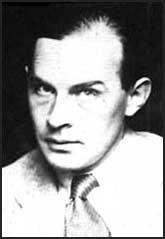Erich Maria Remarque

Erich Maria Remarque was born in Osnabruck, Germany, in 1898. He was called up to the German Army in 1916 and was wounded while carrying an injured soldier out of the action.
After the First World War Remarque became a teacher and in 1929, his novel about his war experiences, All Quiet on the Western Front, was published in Germany. Remarque's book was attacked by Adolf Hitler and Joseph Goebbels and after the Nazi Party gained power Remarque decided to move to Switzerland where he finished The Road Back. A book about a group of ex-soldiers trying to live in defeated Germany.
Remarque was criticised by the Nazi Germany government and in 1933 All Quiet on the Western Front and The Road Back were both banned and destroyed by the Nazis.
On the outbreak of the Second World War, Remarque emigrated to the United States and became a naturalized citizen. Other books by Remarque include Flotsam (1941), Arch of Triumph (1946), The Black Obelisk (1957) and The Night in Lisbon (1962).
Erich Maria Remarque died in 1970.
Primary Sources
(1) Erich Maria Remarque, All Quiet on the Western Front (1929)
I am often on guard over the Russians. In the darkness one sees their forms move like stick storks, like great birds. They come close up to the wire fence and lean their faces against it. Their fingers hook round the mesh. Often many stand side by side, and breathe the wind that comes down from the moors and the forest.
They rarely speak and then only a few words. They are more human and more brotherly towards one another, it seems to me, than we are. But perhaps that is merely because they feel themselves to be more unfortunate than us. Anyway the war is over so far as they are concerned. But to wait for dysentery is not much of a life either.
A word of command has made these silent figures our enemies; a word of command might transform them into our friends. At some table a document is signed by some persons whom none of us knows, and then for years together that very crime on which formerly the world's condemnation and severest penalty fall, becomes our highest aim. Any non-commissioned officer is more of an enemy to a recruit, any schoolmaster to a pupil, then they are if they were free.
(2) Erich Maria Remarque, All Quiet on the Western Front (1929)
We march up, moody or good-tempered soldiers - we reach the zone where the front begins and become on the instant human animals.
We want to live at any price; so we cannot burden ourselves with feelings which, though they might be ornamental enough in peace-time, would be out of place here.
All other expressions lie in a winter sleep, life is simply one continual watch against the menace of death; - it has transformed us into unthinking animals in order to give us the weapon of instinct - it has reinforced us with dullness, so that we do not go to pieces before the horror, which would overwhelm us if we had clear, conscious thought - it has awakened in us the sense of comradeship, so that we escape the abyss of solitude - it has lent us the indifference of wild creatures, so that in spite of all, we perceive the positive in every moment, and store it up against the onslaught of nothingness.
(3) Erich Maria Remarque, The Road Back (1931)
The later it gets the more disturbed the city becomes. I go with Albert through the streets. Men are standing in groups at every corner. Rumours are flying. It is said that the military have already fired on a procession of demonstrating workers. From the neighbourhood of St Mary's church comes suddenly the sound of rifle shots, at first singly, then a whole volley. Albert and I look at each other; without a word we set off in the directions of the shots.
Ever more and more people come running toward us. "Bring rifles! the bastards are shooting!" they shout. We quicken our pace. We wind in and out of the groups, we shove our way through, we are running already - a grim, perilous excitement impels us forward. We are gasping. The racket of rifle-fire increases.
Ludwig is running beside us. His lips are pressed tight, the jaw bones stand out, his eyes are cold and tense - once more he has the face of the trenches. Albert too. I also. We run towards the rifle shots, as if it were some mysterious, imperative summons.
The crowd, still shouting, gives way before us. We plough our way through. Women hold their aprons over their faces and go stumbling away. A roar of fury goes up. A wounded man is being carried off.
We reach the Market Square. There the Reichwehr has taken up a position in front of the Town Hall. The steel helmets gleam palely. On the steps is a machine-gun ready for action. The square is empty; only the streets that lead into it are jammed with people. It would be madness to go farther - the machine-gun is covering the square.

